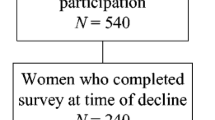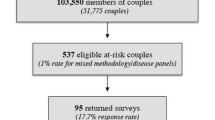Abstract
Expanded carrier screening (ECS) is a relatively new carrier screening option that assesses many conditions simultaneously, as opposed to traditional ethnicity-based carrier screening for a limited number of conditions. This study aimed to explore pregnant women’s perspectives on ECS, including reasons for electing or declining and anxiety associated with this decision-making. A total of 80 pregnant women were surveyed from Northwestern Medicine’s Clinical Genetics Division after presenting for aneuploidy screening. Of the 80 participants, 40 elected and 40 declined ECS. Trends regarding reasons for electing or declining ECS include ethnicity, desire for genetic risk information, lack of family history, perceived likelihood of being a carrier, and perceived impact on reproductive decisions. Individuals who declined ECS seemed to prefer ethnicity-based carrier screening and believed that ECS would increase their anxiety, whereas individuals who elected ECS seemed to prefer more screening and tended to believe that ECS would reduce their anxiety. These findings provide insight on decision-making with regard to ECS and can help guide interactions that genetic counselors and other healthcare providers have with patients, including assisting patients in the decision-making process.
Similar content being viewed by others
References
American College of Obstetricians and Gynecologists (ACOG). (2011). Committee opinion number 486: update on carrier screening for cystic fibrosis. Obstetrics & Gynecology, 117(4), 1028–1031.
American College of Obstetricians and Gynecologists (ACOG). (2017a). Committee opinion number 690: carrier screening in the age of genomic medicine. Obstetrics & Gynecology, 129, e35–e40.
American College of Obstetricians and Gynecologists (ACOG). (2017b). Committee opinion number 691: carrier screening for genetic conditions. Obstetrics & Gynecology, 129, e41–e55.
Chen, L., & Goodson, P. (2007). Factors affecting decisions to accept or decline cystic fibrosis carrier testing/screening: a theory-guided systematic review. Genetics in Medicine, 9(7), 442–450.
Cho, D., McGowan, M. L., Metcalfe, J., & Sharp, R. R. (2013). Expanded carrier screening in reproductive healthcare: perspectives from genetics professionals. Human Reproduction, 28(6), 1725–1730.
Edwards, J. G., Feldman, G., Goldberg, J., Gregg, A. R., Norton, M. E., Rose, N. C., et al. (2015). Expanded carrier screening in reproductive medicine—points to consider: a joint statement of the American College of Medical Genetics and Genomics, American College of Obstetricians and Gynecologists, National Society of Genetic Counselors, Perinatal Quality Foundation, and Society for Maternal-Fetal Medicine. Obstetrics & Gynecology, 125(3), 653–662.
Ekstrand Ragnar, M., Tyden, T., Kihlbom, U., & Larsson, M. (2016). Swedish parents’ interest in preconception genetic carrier screening. Upsala Journal of Medical Sciences, 121(4), 289–294.
Gilmore, M. J., Schneider, J., Davis, J. V., Kauffman, T. L., Leo, M. C., Bergen, K., et al. (2017). Reasons for declining preconception expanded carrier screening using genome sequencing. Journal of Genetic Counseling, 26(5), 971–979.
Grody, W. W. (2016). Where to draw the boundaries for prenatal carrier screening. Journal of the American Medical Association, 316(7), 717–719.
Grody, W. W., Cutting, G. R., Klinger, K. W., Richards, C. S., Watson, M. S., & Desnick, R. J. (2001). Laboratory standards and guidelines for population-based cystic fibrosis carrier screening. Genetics in Medicine, 3(2), 149–154.
Grody, W. W., Thompson, B. H., Gregg, A. R., Bean, L. H., Monaghan, K. G., Schneider, A., & Lebo, R. V. (2013). ACMG position statement on prenatal/preconception expanded carrier screening. Obstetrical & Gynecological Survey, 68(12), 785–787.
Haque, I. S., Lazarin, G. A., Kang, H. P., Evans, E. A., Goldberg, J. D., & Wapner, R. J. (2016). Modeled fetal risk of genetic diseases identified by expanded carrier screening. Journal of the American Medical Association, 316(7), 734–742.
Harris, H., Scotcher, D., Hartley, N., Wallace, A., Craufurd, D., & Harris, R. (1996). Pilot study of the acceptability of cystic fibrosis carrier testing during routine antenatal consultations in general practice. British Journal of General Practice, 46, 225–227.
Holtkamp, K. C. A., van Maarle, M. C., Schouten, M. J. E., Dondorp, W. J., Lakerman, P., & Henneman, L. (2016). Do people from the Jewish community prefer ancestry-based or pan-ethnic expanded carrier screening? European Journal of Human Genetics, 24, 171–177.
Ioannou, L., McClaren, B., Massie, J., Lewis, S., Metcalfe, S. A., Forrest, L., & Deltaycki, M. B. (2014). Population-based carrier screening for cystic fibrosis: a systematic review of 23 years of research. Genetics in Medicine, 16(3), 207–216.
Julian, L. J. (2011). Measures of anxiety: state-trait anxiety inventory (STAI), beck anxiety inventory (BAI), and hospital anxiety and depression scale-anxiety (HADS-A). Arthritis Care & Research, 63, S467–S472.
Kauffman, T. L., Irving, S. A., Leo, M. C., Gilmore, M. J., Himes, P., McMullen, C. K., et al. (2017). The NextGen study: patient motivation for participation in genomic sequencing for carrier status. Molecular Genetics & Genomic Medicine, 5(5), 508–515.
Kingsmore, S. (2012). Comprehensive carrier screening and molecular diagnostic testing for recessive childhood disease. PLoS Currents, 4, e4f9877ab8ffa9.
Langlois, S., Benn, P., & Wilkins-Haug, L. (2015). Current controversies in prenatal diagnosis 4: preconception expanded carrier screening should replace all current prenatal screening for specific single gene disorders. Prenatal Diagnosis, 35, 23–28.
Lazarin, G. A., Detweiler, S., Nazareth, S. B., & Ashkinadze, E. (2015). Genetic counselors’ perspectives and practices regarding expanded carrier screening after initial clinical availability. Journal of Genetic Counseling, 25(2), 395–404.
Liu, X., Law, H. Y., Tan, Y. M., & Hong, Y. (2010). High-throughput B-thalassemia carrier screening by allele-specific Q-primer real-time polymerase chain reaction. Analytical Biochemistry, 404(1), 97–99.
Plantinga, M., Birnie, E., Abbott, K., Sinke, R. J., Lucassen, A. M., Schuurmans, J., et al. (2016). Population-based preconception carrier screening: how potential users from the general population view a test for 50 serious diseases. European Journal of Human Genetics, 24, 1417–1423.
Pletcher, B. A., Gross, S. J., Monaghan, K. G., Driscoll, D. A., & Watson, M. S. (2008). The future is now: carrier screening for all populations. Genetics in Medicine, 10(1), 33–36.
Poppelaars, F. A., Henneman, L., Ader, H. J., Cornel, M. C., Hermens, R. P., van der Wal, G., & ten Kate, L. P. (2004). Preconceptional cystic fibrosis carrier screening: attitudes and intentions of the target population. Genetic Testing, 8, 80–89.
Rothwell, E., Johnson, E., Mathiesen, A., Golden, K., Metcalf, A., Rose, N. C., & Botkin, J. R. (2017). Experiences among women with positive prenatal expanded carrier screening results. Journal of Genetic Counseling, 26(4), 690–696.
Schneider, J. L., Goddard, K. A., Davis, J., Wilfond, B., Kauffman, T. L., Reiss, J. A., et al. (2016). “Is it worth knowing?” Focus group participants’ perceived utility of genomic preconception carrier screening. Journal of Genetic Counseling, 25, 135–145.
Uhlmann, W. R., Schuette, J. L., & Yashar, B. M. (2009). A guide to genetic counseling (2nd ed.). New York: Wiley-Blackwell.
Veach, P. M., LeRoy, B. S., & Bartels, D. M. (2003). Facilitating the genetic counseling process: a practice manual. New York: Springer-Verlag New York, Inc..
Acknowledgments
The authors would like to express gratitude to all of the people who were involved in the completion of this study. They would like to thank the Northwestern University Graduate Program in Genetic Counseling, who provided funding for this Master’s thesis project. In addition, they would like to express great appreciation to the genetic counselors at Northwestern Medicine, who provided essential assistance with regard to participant recruitment. Lastly, they would like to thank all of the patients who elected to participate in this study.
This study was performed by first author Lauren Propst as part of fulfilling a Master of Science in Genetic Counseling training program.
Author information
Authors and Affiliations
Corresponding author
Ethics declarations
Conflict of Interest
Authors Gwendolyn Connor and Jeffrey Dungan are currently employed by Insight Medical Genetics. Insight Medical Genetics did not provide any funding for this study, and they did not perform any of the genetic testing for participants in the study. Authors Lauren Propst, Megan Hinton, and Tabitha Poorvu declare that they have no conflict of interest.
Human Studies and Informed Consent
All procedures followed were in accordance with the ethical standards of the responsible committee on human experimentation (institutional and national) and with the Helsinki Declaration of 1975, as revised in 2000 (5). Informed consent was obtained from all patients for being included in the study.
Electronic Supplementary Material
Online Resource 1
(PDF 252kb)
Online Resource 2
(PDF 182kb)
Online Resource 3
(PDF 82kb)
Online Resource 4
(PDF 124kb)
Rights and permissions
About this article
Cite this article
Propst, L., Connor, G., Hinton, M. et al. Pregnant Women’s Perspectives on Expanded Carrier Screening. J Genet Counsel 27, 1148–1156 (2018). https://doi.org/10.1007/s10897-018-0232-x
Received:
Accepted:
Published:
Issue Date:
DOI: https://doi.org/10.1007/s10897-018-0232-x




